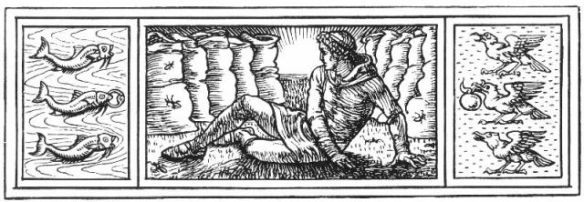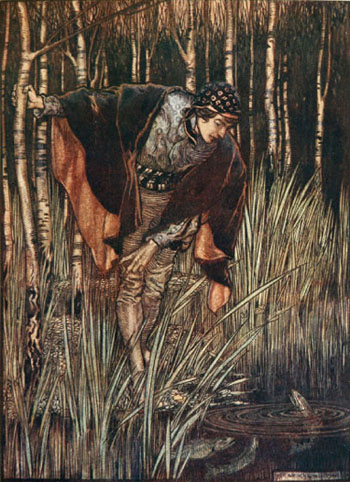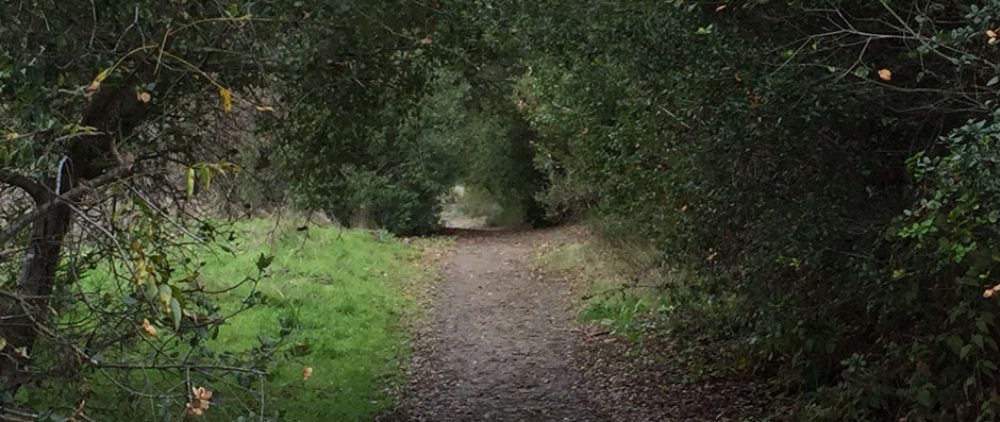
Illustration for “The White Snake” by Walter Crane, ca. 1886, Public Domain
I once had a professor who made an extensive study of world folklore and said the greatest predictor of success for a fairytale hero is winning the help of an animal guide. Most often, the helpful animals are mammals, like Puss-in-Boots or talking horses.
“The White Snake,” a story from the Brothers Grimm, alters this pattern in startling ways. The helpful creatures are far more primitive, and the hero actually kills his horse – yet things come out right. The story has stayed with me since I first encountered it, as a wisdom tale centered on the theme of knowing the right thing to do at the right time, even when it violates norms and expectations.
Commentary on myth and folktales is a recent tradition that arose after the old ways of absorbing these stories, around hearth and campfire, disappeared. We can imagine earlier listeners holding the stories in imagination, letting the magic sink in over time, as we do with favorite novels and movies. This is a great way to experience a story, and we’re fortunate to have a good eight minute recording of The White Snake, accompanied by the text from the Brothers Grimm.
I suggest you read and listen to the story if you don’t know it, for the rest of this post will simply be my reflections on a few of the key questions The White Snake raises.
Q: If only a trusted servant is allowed to carry the secret dish into the king, and nobody knows what’s under the cover, where does the daily snake come from?
A: We don’t know and never will. We’re used to novels with backstories. In fairytales, which in some ways are closer to lived experience, causes are often hidden.
Q: After years (presumably) as a trusted servant, why does our hero break a cardinal rule at precisely the right time – the day before he will need understanding of the speech of animals to save his life?
A: This question points to a core theme of this story, the power of intuition. Fairytale people are never developed characters, but always types – most of the time, we don’t even know their name. The trusted servant has a developed intuition even before his adventures begin. The allies he finds on the road do not give him something new, but help him refine what he already has until his story culminates in winning the had of the princess.
Tenzin Wangyal Rinpoche, a Tibetan master, speaks of the “crazy wisdom” attributed to yogis and saints of the past, who were known for unconventional behavior. Wangyal says when we’re in touch with our true nature, we are far more likely to respond appropriately to each unique moment, rather than compulsively repeat habitual behavior, or listen to the smart ego, which always says, “That’s silly.”
The White Snake reminds me of real life parallels I’ve heard in accounts of survivors of 9/11. One Christian writer who was scheduled to travel to London that day felt a nagging compulsion to travel several days early, for no reason he could discern. In the habit of looking at hunches as possible divine inspirations, he followed his hunch. In writing of the event later, he wrestled with the question of why God would inspire one person but not others? “Maybe He did,” the writer said, “but they didn’t listen.”
The servant’s gift of attending to small things will save him again and again.

The White Snake by Arthur Rackham
Q: Why on earth would anyone kill a fine (and expensive) horse to feed three baby crows, when they could just as easily dig in the forest floor to find some worms?
A: Jungians would say the more “primitive” the animal, and the more removed from our daily experience, the more it reflects the deeper levels of psyche, rather than the “smart ego.” The latter, often represented in Grimm by arrogant older brothers, rides a fine steed into trouble. You have to attend to small things to notice ants in the road. You have to trust your hunches to know when to give the crows whatever they need. You have to trust the unconscious or divine inspiration to change a flight reservation because it “doesn’t feel right.” Such “small” moves can save our lives.
A 2005 Time Magazine article, “How to Get Out Alive,” presents the result of interviews with almost 900 people who escaped the Twin Towers after the planes hit. A few left immediately, but most delayed an average of six minutes, and some waited as long as half an hour. After the plane crash, when the tower lurched so violently that some thought it would topple right then, one woman reported that her first instinct, rather than escape, was an intense desire for someone to say, “Don’t worry, it’s going to be all right.”
Fortunately, a nearby co-worker screaming, “Get out of the building,” woke her from her trance. Interviewed four years later, she still wondered what she would have done if that that co-worker hadn’t called out. She might have been one of the estimated 135 people, with access to open stairwells and time to exit, who stayed in the towers and died.
This tendency, which researchers call “normalcy bias” is common in natural disasters of all kinds. I’m not speaking of tragedies like the recent California wildfires and mudslides the came upon some without warning. Normalcy bias refers to our hesitancy to heed evacuation orders and warnings, even when there is time to do so. Normalcy bias refers to the voice on the loudspeaker on one of the floors of the towers, telling people to remain at their desks, that things were under control…
In order to get along, we have to learn to play by the rules, but sometimes those rules will kill us. Sometimes we live and grow only by tasting the forbidden snake. It is then that we learn to heed the small things that others ignore. The ability to look beyond our concepts and biases may allow us to hear the still voices of genuine council, moment by moment, as we make our way through the forest.

This is indeed a very odd story, even by fairytale standards – and right from the start with the servant eating a bit of the snake. Flaunting his trusted position. Cutting bits off a live snake? Didn’t it mind? All a bit questionable, methinks, to then be rewarded with the gift of acute perception, which then lead him to great good fortune. I’m thinking the informant who gave the Grimms this tale might have gotten the details a bit screwed up, or there were more parts that were not properly remembered 🙂 – though I take your point re the value of following your intuition. Thanks for posting this.
LikeLike
I’ve always assumed the snake was dead and cooked! The snake in the Garden of Eden offering knowledge was, in earlier eras, a postitive thing, according to Campbell. I’ve seen many tales of heroes collecting strange companions whose skills win him a princess in the end – except I can’t really remember them, but I clearly remember this one.
LikeLiked by 1 person
Well it does rather stick in the mind 🙂
LikeLike
For me the moral of the story is not to take care of the small things, but rather “if you want to have a friend, be one”. Except to readers who are ducks and horses, the servant constantly helps others out of altruism without ever thinking of any personal reward. However, like all acts of kindness, his are not forgotten and allies come to him in his hour of need.
I enjoyed this tale very much, and I had never heard it before.
LikeLike
I came upon in fairly recently (as in 2-3 years ago) myself. Glad you enjoyed it!
LikeLike
I tell this tale and have blogged on it as well. I suspect the ravens are of shamanistic origins, the hint being they fly between earth and the other world. This is also a hint at the long-ago origins of this tale.
LikeLike
Your comment brings Odin and his Ravens to mind! Thanks, I had not thought of that before.
LikeLike
Interesting analysis of a very unusual fairy tale. I like this a lot. Thanks for the post.
LikeLike
I had been wanting to blog on this story for about six months. Made a couple of false starts. This time it came together. Glad you enjoyed the story!
LikeLike
Summary on this story
LikeLike
I just came across this post after reading the tale and googling “what the hell does this mean?” And WOW was this informative. Ive been reading through all of Grimm (one a day) and some of the morals just fly right over my head! Thank you for this post! I will mull over this and come up with my own interpretation in time, but in the mean time I like yours.
LikeLike
Glad you like the post. The White Snake for me, is one of the most compelling Grimm tales.
LikeLike